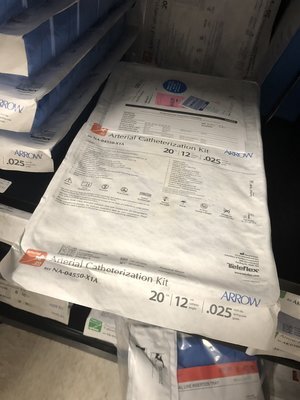ARTERIAL LINES
Arterial lines have a lot of utility in the ICU. They are never an “emergency” line (unless you truly cannot get a blood pressure) but add a lot of value to the work-up and monitoring of a patient. Some benefits include -
You get a live, (for the most part) accurate blood pressure that changes by the second every time the blood hits the probe
This includes in patient who has a cardiac arrest - you can visually see if there is a pulse back
You are able to draw labs and ABGs from them - great for patients who are difficult arterial sticks
You can connect it to flotrack and know more about the heart and volume status
Where can I put it?
We primarily place them in the radial and femoral arteries. Under VERY rare + special circumstances they can be placed in the ulnar, brachial or axillary arteries. Never place an a-line in the carotid artery.
A femoral arterial line kit
SO I WANNA DO A RADIAL ARTERY ARTERIAL LINE. WHAT DO I GET FROM THE CART?
Stat lock - in a red package
Probe cover - to be able to use your ultrasound sterile
Biopatch - smallest size; to keep line clean afterward
Tape - to tape down patients arm
Sterile Towels - to create your sterile field (the drape in the a-line kit can also be used but its very small)
Sterile gown - to get sterile
Chloraprep - to clean the patients skin
A-line kit - to do the actual a-line. For radial, only one size
Non-sterile flushes - must squirt into kit, cannot drop them onto kit
Sterile gloves in your size (not pictured)
INSIDE AN ARTERIAL LINE KIT
Drape - to keep area sterile if you don’t use sterile towels (see above)
The wire - to do the seldinger technique
Suture - if you’d like to suture it in (not recommended)
Lidocaine - usually numbing the area is just as bad as the line but can be used if desired
Gauze - a-lines are bloody; to keep it clean
Long catheter - your actual “line” that stays in the patient
Angiocath - can be used as alternative “line”
Needle holder - to keep your sharps secure
Blood port - to squirt blood into when doing the line
Needle - to access the vessel
Blade - shouldn’t be used





